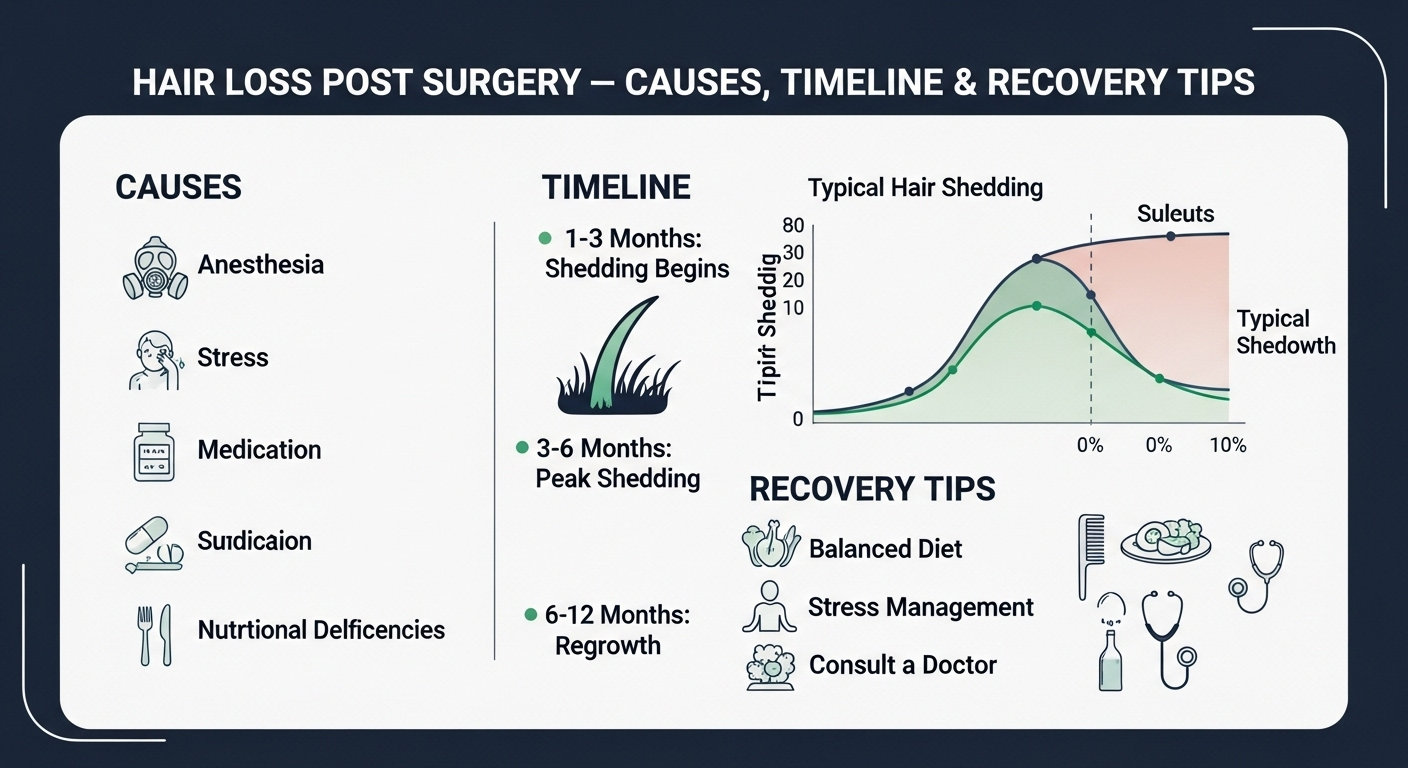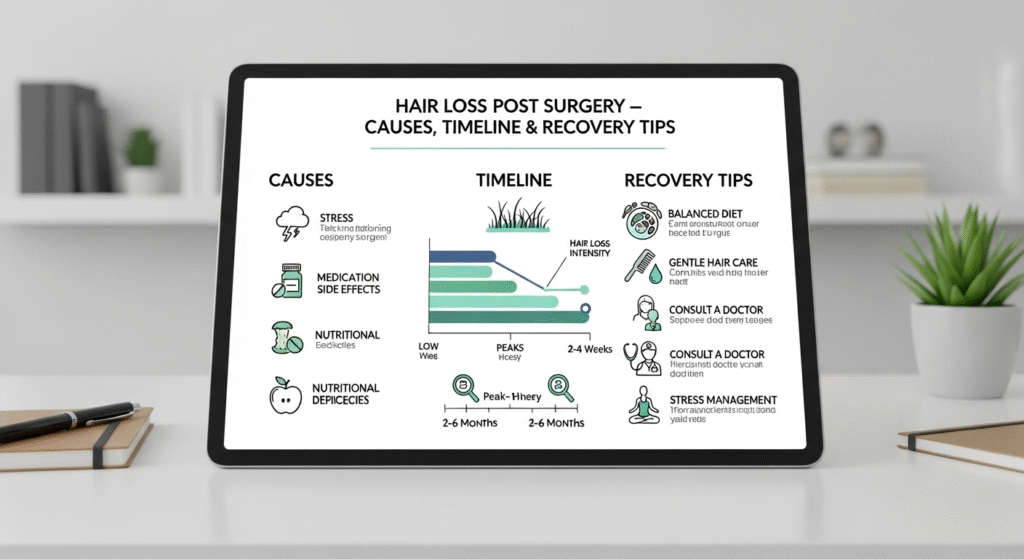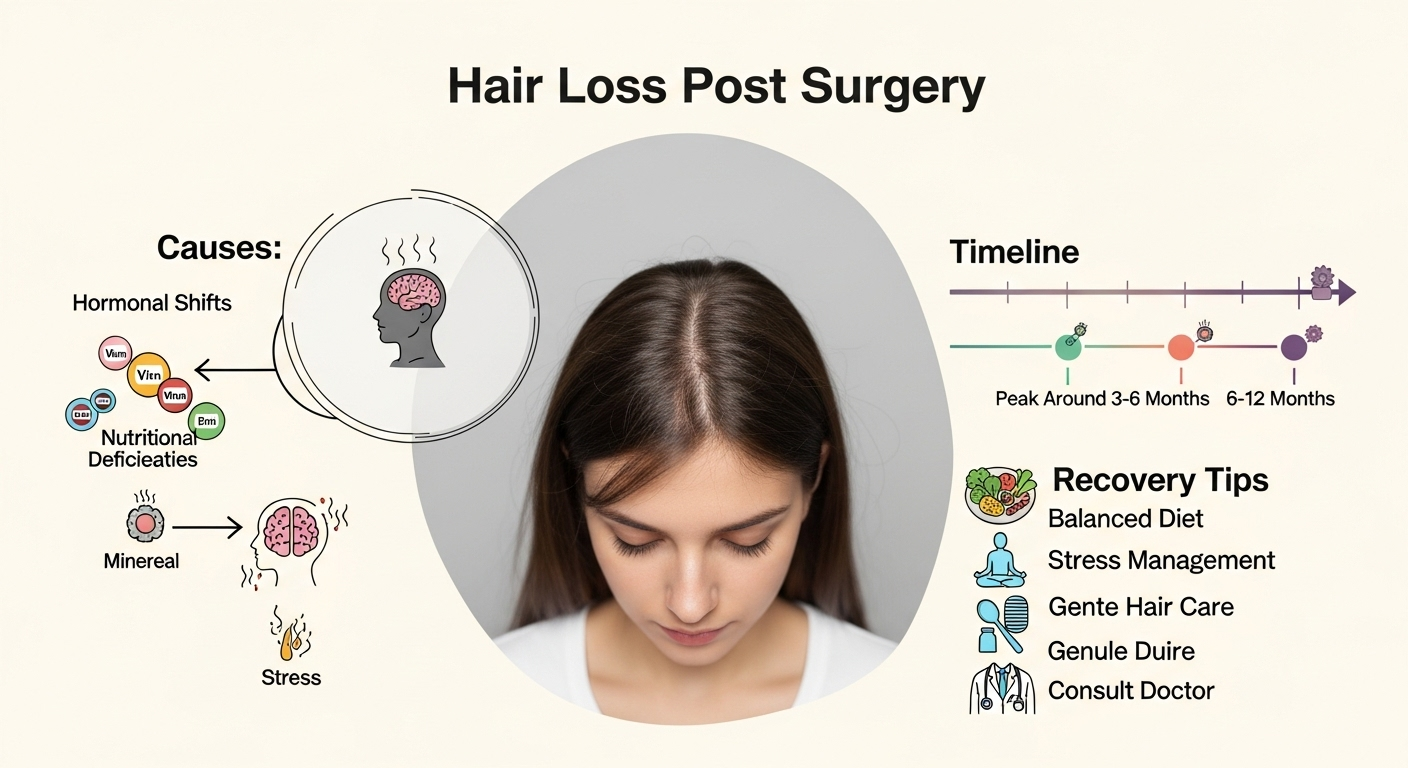Are you noticing excessive shedding after a recent medical procedure? Hair loss post surgery is a common and often temporary response to physical and emotional stress caused by surgery. In this guide, you'll learn what triggers it, when it typically happens, how long it lasts, and what you can do to promote recovery. With expert-backed …
Are you noticing excessive shedding after a recent medical procedure? Hair loss post surgery is a common and often temporary response to physical and emotional stress caused by surgery.
In this guide, you’ll learn what triggers it, when it typically happens, how long it lasts, and what you can do to promote recovery. With expert-backed insights and practical solutions, we’ll help you manage post-operative hair loss with clarity and confidence.

What Is Post-Surgical Hair Loss?
Hair loss post surgery typically falls into one of two categories:
1. Telogen Effluvium
This is the most common cause of shedding after surgery. It occurs when a stressor—like major surgery—pushes large numbers of hair follicles into the resting (telogen) phase prematurely. After a few months, those hairs fall out at once, often appearing as sudden thinning or excessive shedding.
2. Pressure Alopecia
This condition results from prolonged pressure on the scalp during lengthy surgeries, particularly when the head remains in one position for hours. It usually causes patchy hair loss in localized areas.
Why Does Hair Loss Occur After Surgery?
There are several well-documented reasons why you may lose hair following surgery:
Surgical Stress
The trauma of surgery—combined with anxiety, blood loss, or pain—can disrupt your body’s normal hair cycle and push more follicles into the resting (telogen) phase.
Anesthesia and Medications
Some anesthetic agents may temporarily impact hair growth cycles or blood flow to the scalp, especially during prolonged operations. Blood pressure drops or shock events may contribute to post-operative follicle disruption.
Pressure-Induced Hair Loss
Extended time in one head position can limit oxygen and nutrient supply to local scalp tissue. This can damage follicles, especially in immobilized patients (e.g., ICU, orthopedic, or neurosurgery patients).
Typical Timeline for Hair Loss and Regrowth

2–3 Months Post-Surgery: Shedding Begins
Most people experience noticeable hair fall 6–12 weeks after their operation. This aligns with the hair’s natural telogen phase, which precedes shedding.
3–6 Months: Stabilization
Hair loss usually begins to slow or stabilize around the 3–4 month mark. At this point, most follicles have started a new anagen (growth) phase.
6–12 Months: Regrowth
Most individuals see significant regrowth by 6 months, with full recovery possible in 9–12 months. However, factors like age, nutrition, and underlying conditions can influence the timeline.
Managing and Preventing Post-Surgery Hair Loss

While not always preventable, several measures can help reduce hair loss severity or accelerate regrowth:
Prevention Tips
- Alternate head positioning during surgery to reduce pressure points
- Use padded supports or cushions for long surgeries
- Limit surgical duration when possible
Scalp & Hair Care
- Avoid tight hairstyles or ponytails
- Use mild, sulfate-free shampoos
- Skip heat tools and harsh chemicals for at least 3–4 months post-op
Nutritional Support
Your body needs resources to rebuild. Prioritize:
- Protein (hair is made of keratin)
- Iron & zinc (for cell division and repair)
- Biotin & vitamin D (support follicle function)
Treatments to Support Regrowth
If your shedding continues or regrowth is slow, you may consider treatments such as:
Topical Minoxidil
An over-the-counter medication that can speed up the anagen phase and reduce further loss.
Scalp Microneedling / PRP Therapy
These treatments stimulate circulation and collagen production in the scalp, improving follicle health.
Low-Level Laser Therapy (LLLT)
FDA-cleared devices (combs, helmets) that use light therapy to stimulate follicles.
Decision-Making & Next Steps
If you’re concerned about hair loss post surgery:
- Track your shedding (amount, location, pattern)
- Get blood work done to assess deficiencies
- Ask your doctor whether the hair loss is likely stress-related or positional
- Consider seeing a trichologist or dermatologist
Planning Ahead for Long Surgeries
If you have an upcoming major surgery:
- Discuss scalp support and repositioning with your surgical team
- Prepare your body with a balanced, nutrient-dense diet
- Have a post-op hair plan in place (gentle care + nutrition)
FAQ
Is post-surgery hair loss permanent?
Usually not. Most cases of telogen effluvium resolve within 6–12 months.
Why did I lose hair 2–3 months after surgery—not right away?
That’s because the telogen (resting) phase lasts several weeks before shedding occurs.
Can I use biotin or collagen to help?
Yes, but only if you’re deficient. Always consult your doctor first.
What if I’m still losing hair after 6 months?
See a dermatologist to check for chronic TE, scarring alopecia, or other underlying conditions.
Is this more common after certain types of surgery?
Yes. Long or invasive procedures (e.g., orthopedic, heart, brain surgery) have higher risk due to stress and head positioning.
Ready To Take Your Next Step
Worried about excessive shedding after a procedure? Book a consultation with Dr. Uzma Irfan, an ISHRS-certified surgeon, today to evaluate your condition, rule out complications, and create a personalized regrowth plan. Don’t let temporary hair loss affect your recovery—support your healing journey with expert care.






